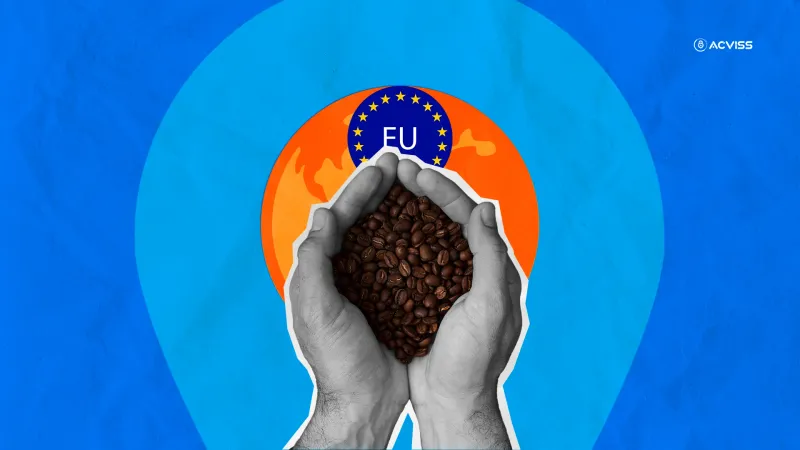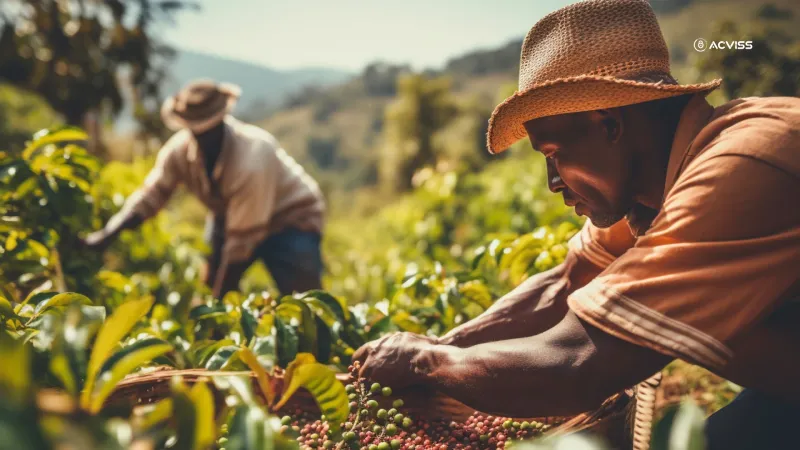EUDR is Transforming Coffee Export: The Pros and Cons

The European Union has decided. Their new Deforestation-Free Product regulation will come into effect by 30th December 2024. Surely, upholding the ideas of sustainability and ethical production practices is the main aim of the new law, but are they benefiting the producers?
The EUDR was adopted on May 31st to end the large-scale deforestation practices which were creating significant environmental and societal issues. Studies have stated that large-scale agriculture has been a cause of 75% of the deforestation globally. This has raised concerns regarding the practices followed in the agricultural industry. The regulation, aligning with the Paris Agreement and Green Deal, has taken a giant leap towards addressing the root cause of the problems; corruption, environmental degradation and social injustices.
What is EUDR and Who does it affect?
EUDR mandates producers and manufacturers to certify their products as eco-friendly and sustainable. This means that during the process of production, manufacturing or distribution, the product has not resulted in deforestation practices. Importers are required to provide geolocation data of the production areas to ensure traceability. This data helps verify compliance with deforestation-free requirements. The traceability also provides a transparent method to verify the authenticity of products, reducing the number of counterfeits entering the market.
Currently, the regulation targets seven product categories, majorly applied to agricultural products. The list includes:
- Cattle
- Cocoa
- Palm Oil
- Soya
- Rubber
- Wood
- Coffee
The study findings suggest that these seven products, due to their wider usage and market demand have largely contributed to the environmental degradation. However, a significant problem that came up during the process was imposing EUDR in the coffee industry wouldn’t be as simple.
EUDR and Coffee Farmers
With an estimated global value of $161 Billion, the coffee industry is one of the fastest-growing food and beverage products in the 21st century. Thanks to the changing culture, coffee is getting larger demand even among the younger generations. Europe has the biggest share of the global coffee market with 31% of coffee consumption in 2022. Countries like Brazil, Ethiopia and Vietnam have revived their economy through the production and exporting of coffee. The coffee industry supports millions of livelihoods, from smallholder farmers to large-scale producers, and is integral to the economies of many developing nations. This rising demand caused further expansion often through deforestation and forest degradation.
However, the reaction to EUDR was mixed
Brazil, the largest producer, has voiced support for sustainable agriculture but also highlighted the need for international cooperation and financial support to ensure that smallholder farmers can meet the EUDR requirements.
Challenges of Implementing EUDR on Coffee Exports
1. Traceability and Transparency
EUDR depends on the geolocation data and the ability to trace the origin of the product. This is a significant challenge for coffee exporters. The coffee supply chain, especially in developing and underdeveloped countries, is often characterized by numerous intermediaries, making it difficult to trace the origin of every batch. Coffee is mostly produced by smallholder farmers. They sell their crops to local co-operatives or middlemen, who sell to exporters. Bringing transparency and traceability to such a broken supply chain can be complex and expensive.
2. Increased Costs
The fragmented supply chain will increase the cost of implementing EUDR. Costs of investments in technology for traceability, administrative expenses and third-party certification are on the high side. This makes it difficult for small farmers and exporters to afford. Vietnam is one such country where small farmers struggle to bear the financial burden brought on by compliance. Without external support, their chances of missing out on their market and sales are huge.
3. Market Access and Competitiveness
When the cost and awareness required to comply with EUDR are high, it is evident that only the ones that can afford them will succeed in the market. This could reshape the existing coffee competitive market. Producers and exporters who can pay for the traceability solutions will have an advantage in accessing the EU market, which is the bread and butter for most coffee exporters. Brazil, being the biggest exporter of coffee, has begun investing in sustainable practices and certifications. Several Brazilian companies have started working with coffee farmers to improve sustainability and traceability. This could position Brazilian coffee as a favourable option in the EU market.
4. Environmental and Social Impacts
EUDR devised to prevent deforestation is assured to drive a positive impact on overall environmental conditions in coffee-producing geographies. Countries like Ethiopia, where coffee production is a critical part of the economy and culture have been subjected to large-scale deforestation. However, many coffee farmers in the country claim that deforestation is required to maintain their production. Cutting trees down for coffee trees to get more sunlight is seen as a survival practice for Ethiopian farmers. That’s where governmental and external support programs should initiate sustainable coffee farming, such as agroforestry practices that can enhance environmental conservation while improving farmers’ livelihoods.
5. Capacity Building and Support
EUDR is happening. To be effective and equitable, it is important to bring in support mechanisms and capacity-building initiatives. The International Coffee Organization (ICO) has been providing support to coffee-producing countries to prepare them to be compliant with the new regulations of EUDR. Similarly, governmental agencies, international organizations and other stakeholders must collaborate to provide technical assistance, financial support and necessary training and education to coffee farmers and exporters.
Must Read: The Critical Role of Traceability in EUDR Compliance.

Pathways to Compliance and Sustainability
1. Technology and Innovation
The key to getting products EUDR-compliant is to leverage technological solutions. Coffee farmers can implement solutions like Blockchain, satellite imagery or non-cloneable QR authentication to improve traceability, data collection and transparency in the supply chain. The Coffee Board of India was able to successfully implement Origin, Acviss’s blockchain-powered track and trace solution on their coffee products. This allowed them to create immutable records of coffee transactions, ensuring that coffee could be traced from farm to cup. The solution also enabled over 4000+ farmers to get their products to the right customers and increase their earnings. The Origin solution provides verifiable proof of compliance with deforestation-free requirements which the farmers can use to export their products to Europe.
2. Policy and Regulatory Support
National governments in coffee-producing countries must work towards developing regulatory frameworks that align with EUDR while considering the local culture and realities. Supportive policies like incentives for sustainable farming, investment in infrastructure and streamlined administrative processes can motivate producers. The Honduran government and IHCAFE have been working with international partners to promote sustainable coffee production through initiatives to improve market access for smallholder farmers.
3. Consumer Awareness and Demand
Everybody listens to the market. Increasing consumer awareness can motivate demand for deforestation-free products, causing a drastic shift in the market. Educated consumers are more likely to support brands and products that align with their values, creating a market stimulus for compliance with the EUDR. Certifications promoting ethical and sustainable practices, like Fairtrade and Rainforest Alliance have already garnered recognition globally. Expanding these and similar certification schemes can help align consumer demand with the goals of the EUDR.
EUDR: More than a policy!
The EUDR is more than just a policy; it is a call to action for the global coffee industry. The challenges set by the regulations can seem insurmountable, but they also present an unprecedented opportunity to reshape the coffee supply chain. The EUDR serves as a powerful reminder that the future of coffee depends on the health of our planet’s forests and ecosystems. So, take this opportunity to get your priorities right and work toward driving a collective movement towards a deforestation-free future.
At Acviss, we are committed to helping coffee producers and exporters navigate the complexities of the EUDR and enhance their traceability systems. If you are seeking expert guidance on compliance strategies, technological solutions for tracking coffee origins, or support in implementing sustainable practices, we invite you to get in touch with us.
Our team of specialists is ready to assist you in transforming these regulatory challenges into opportunities for growth and sustainability. Contact us today to learn more about how we can support your journey towards a healthy supply chain that improves your growth.